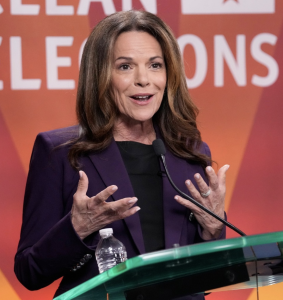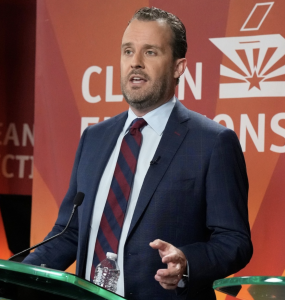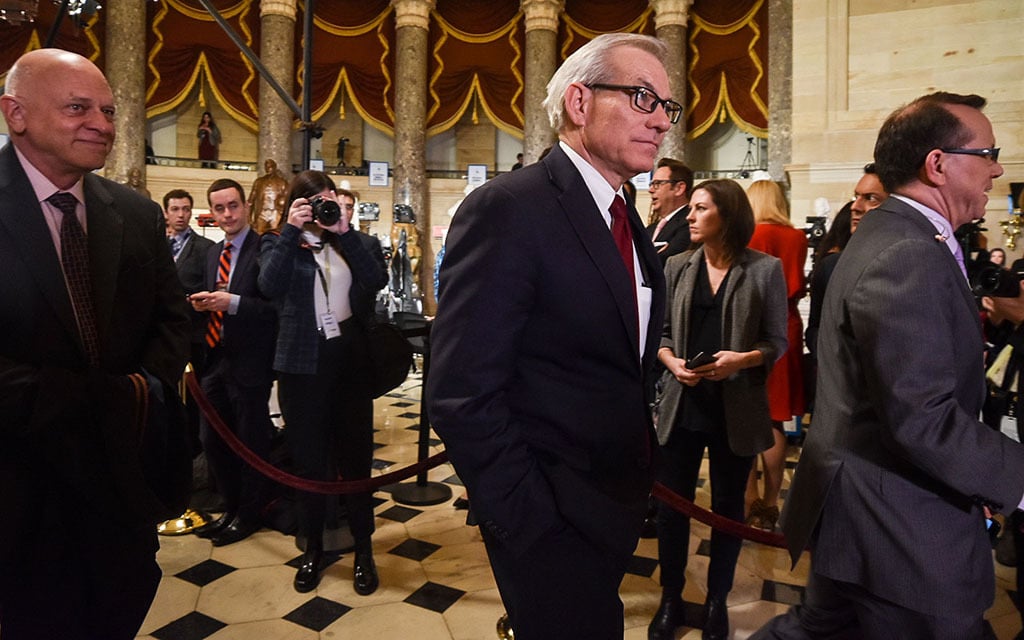WASHINGTON – U.S. Rep. David Schweikert eked out a win in 2022 by just 3,000 votes. With abortion likely on the ballot in November, Democrats are confident they can flip the Phoenix-area district this time around, and a half dozen have lined up to try.
The district includes many of Arizona’s wealthiest suburbs, and Schweikert, a Republican, has emphasized sound fiscal policy and low taxes throughout his seven terms in Congress.
That focus has helped the former Maricopa County treasurer sidestep divisive social issues, though he’s been a reliable ally to anti-abortion forces for years – a record that Democrats are determined to use against him.
“He’s won a lot, and he’s a ruthless campaigner,” said Jason Rose, a Scottsdale-based political consultant, but “the tide is turning in this district, and he certainly has an issue set that’s not particularly helpful to him right now.”
All six of the Democrats in the loaded July 30 primary list abortion rights as their top priority and paint the fiscal conservative incumbent as out of step on that critical issue.
“No one will fight like me,” said Marlene Galán-Woods, a former broadcast journalist endorsed by Emilys List, a PAC that backs abortion-rights Democrats.

Marlene Galán-Woods debates primary opponents during May’s Citizens Clean Elections Commission debate. (Photo courtesy of Citizens Clean Elections Commission)
“I’m the only woman running in this race. I’m the only mother and grandmother running in this race. … No one, no one, will fight harder for the rights of her daughter like a mother,” she said by phone.
Chris Baker, a longtime strategist for Schweikert, accused Democratic candidates of using abortion as a shield to deflect economic and border issues. “They know they’re on the wrong side (of the economy and the border), so they keep coming back and try to make the issue about abortion,” he said.
“I would encourage them to give it all they got,” he said.
Surveys of Arizona voters in June show strong support for abortion rights, with the potential for the November ballot measure to drive turnout.
A Fox News poll found that 70% of registered voters would support a state constitutional amendment allowing abortions through fetal viability or to protect the pregnant woman’s health. A poll from Noble Predictive Insights found that 38% deem a candidate’s stance on abortion “very impactful.”
When Arizona’s Supreme Court ruled in April that a near-complete abortion ban enacted in 1864 was once again enforceable, Schweikert criticized the ruling. The current Legislature should set modern-day policy, he said; state lawmakers did end up repealing the old law.
But as Democrats point out, from 2012 to 2021, Schweikert co-sponsored a “Life at Conception Act” six times. That would have made abortion almost entirely illegal not only in Arizona but nationwide.
Then in June 2022, the U.S. Supreme Court struck down Roe v. Wade and ended nearly 50 years of federal protection for abortion. A national abortion ban of the sort Schweikert had long supported became toxic in swing districts like his.
He kept his name off the 2023 draft of that bill.
Even before the state’s high court revived the 1864 ban, abortion rights advocates launched an effort to put abortion rights on the November ballot. Backers claim more than enough signatures. The Secretary of State will certify that soon after the July 3 filing deadline.
The amendment, protecting abortion access through roughly 24 weeks of pregnancy, will likely “bring out the voters,” said Anita Malik, a Democrat who lost to Schweikert in 2018.
That would not be good news for the incumbent.
The 1st Congressional District encompasses Paradise Valley, part of Scottsdale, and Fountain Hills, where Schweikert lives.
The GOP edge among registered voters is 188,000 to 134,000 Democrats, plus 158,000 independents – more than enough to decide a contest – according to Secretary of State data.
Baker predicted that turnout driven by support for former President Donald Trump will offset any boost Democrats get from the ballot measure.
“They’re going to bet the farm that the abortion initiative will somehow rescue them from what is right now a very tough race for them. … I believe the presidential race will largely drive turnout in this district,” he said.
The nonpartisan Cook Political Report rates the district a toss-up.
The Democrats

From left, Andrei Cherny, Marlene Galán-Woods, Andrew Horne, Kurt Kroemer, Conor O’Callaghan and Amish Shah speak at an Arizona Citizens Clean Elections Commission debate in May. (Photo courtesy of Citizens Clean Elections Commission)
Most of the Democratic contenders are political newcomers.
- Andrei Cherny, a former Arizona Democratic Party chair, raised $1.8 million through the end of March – the most recent filings – and leads the pack financially. He has high-profile endorsements from former President Bill Clinton and current Phoenix Mayor Kate Gallego. He has vowed to push legislation to reinstate Roe v Wade.
- Galán-Woods has raised $1.2 million.
- Amish Shah resigned from the Legislature in January after six years. He is the only candidate who has held public office. He has raised $1 million. Shah was a registered Republican in Maricopa County in 2016, two years before he won a seat in the Legislature as a Democrat. On reproductive rights, he touts his role in derailing proposed restrictions on mifepristone, a drug used in nearly two-thirds of abortions.
- Conor O’Callaghan, a managing director at a financial services firm, has raised $1 million, as well. He has also loaned his campaign $875,000. His team largely comprises the same group that got Secretary of State Adrian Fontes elected in 2022. He’s described abortion as “the No. 1 issue” in the race.
- Andrew Horne, an orthodontist, has raised about $175,000 and put $750,000 of his own money into the effort. His campaign is largely focused on curbing gun violence; his young daughter hid in a closet during a shooting near their house last year. He slammed Schweikert for his record on abortion rights, saying he’s “working against the future for our women, for our children.”
- Kurt Kroemer, former regional CEO of the American Red Cross for Arizona and New Mexico, has raised about $145,000. He has pledged to support the Women’s Health Protection Act, a bill that would re-establish a nationwide right to abortion access and protect the right of health care providers to provide abortions.
The Democrats’ House campaign arm plans a $1.6 million ad blitz against Schweikert. Its Republican counterpart announced Thursday a $1.2 million injection into the Phoenix media market, where Schweikert is the only Republican in a truly competitive district. Outside groups could pour more into the contest.
Schweikert has raised about $2 million and had $1.2 million in the bank at the end of March. He faces low-key primary challenges from Robert Backie, a businessman, and Kim George, a former FBI agent.

Conor O’Callaghan speaks at May’s Arizona Citizens Clean Elections Commission debate. (Photo courtesy of Citizens Clean Elections Commission)
Schweikert made his first bid for Congress in 1994. He lost that primary and another in 2008 before nabbing the seat in 2010. In 2012 after redistricting, he found himself pitted against a fellow Republican freshman Ben Quayle, son of former vice president Dan Quayle.
The campaign was bitter. Schweikert accused his rival of coasting on his father’s name and sent out mailers asserting that Quayle “goes both ways” on conservative issues, insinuating he was bisexual.
In 2022, Johnathan Huey, a political consultant allied with Schweikert, sent out a mailer with an image of Schweikert’s primary opponent posing with another man at a bar: “Elijah Norton Isn’t Being Straight With You,” it read.
Norton sued. Huey settled and paid him $50,000. Schweikert settled separately; the terms have not been made public.
Democrats have thrown different sorts of punches in their own primary.
O’Callaghan has highlighted a federal investigation into an eco-friendly financial firm that Cherny founded, involving allegations of exaggerated carbon offset claims.
He has also slammed Galán-Woods over her GOP roots. Her late husband, Grant Woods, was a close ally of Jan Brewer, the governor loathed by Democrats for passing SB 1070, one of the nation’s toughest immigration laws. O’Callaghan posted footage from Brewer’s 2010 victory party showing Galán-Woods directly behind her, applauding.
Arizonans “cannot afford to have another Kyrsten Sinema,” O’Callaghan said, likening his rival to the Democrat-turned-independent U.S. senator.
Galán-Woods says the GOP changed, not her. But she also wants Democrats to feel reassured about her loyalty, citing endorsements from Rep. Raúl Grijalva of Tucson, Attorney General Kris Mayes and former Gov. Janet Napolitano.
“Lots of people in this district are recovering Republicans,” she said. “People are sick and tired of politicians who spend their time dividing us, not building something up.”

